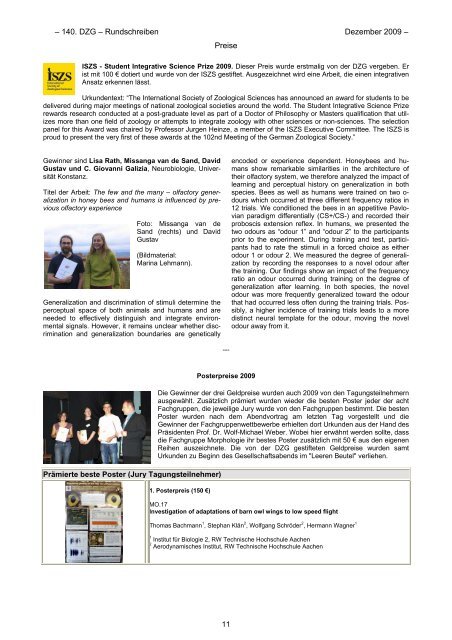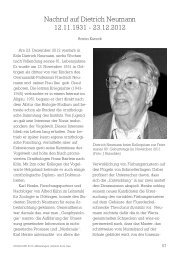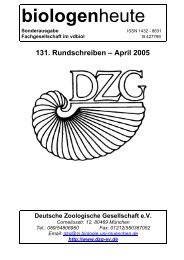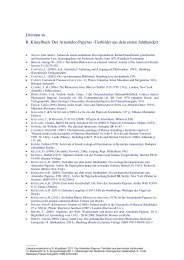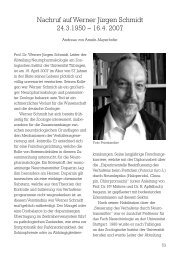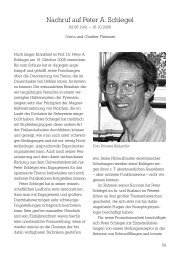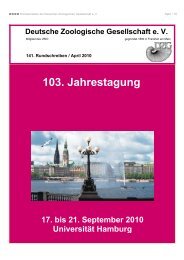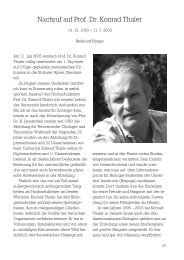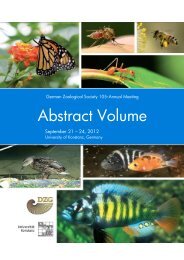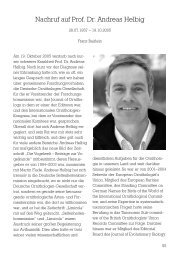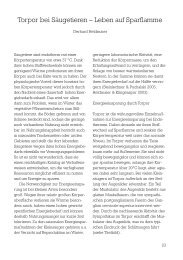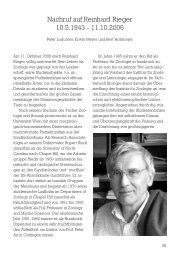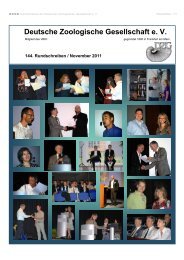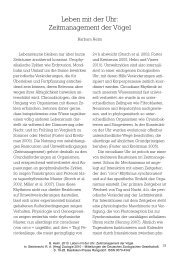Deutsche Zoologische Gesellschaft e. V.
Deutsche Zoologische Gesellschaft e. V.
Deutsche Zoologische Gesellschaft e. V.
Erfolgreiche ePaper selbst erstellen
Machen Sie aus Ihren PDF Publikationen ein blätterbares Flipbook mit unserer einzigartigen Google optimierten e-Paper Software.
– 140. DZG – Rundschreiben Dezember 2009 –<br />
Preise<br />
ISZS - Student Integrative Science Prize 2009. Dieser Preis wurde erstmalig von der DZG vergeben. Er<br />
ist mit 100 € dotiert und wurde von der ISZS gestiftet. Ausgezeichnet wird eine Arbeit, die einen integrativen<br />
Ansatz erkennen lässt.<br />
Urkundentext: “The International Society of Zoological Sciences has announced an award for students to be<br />
delivered during major meetings of national zoological societies around the world. The Student Integrative Science Prize<br />
rewards research conducted at a post-graduate level as part of a Doctor of Philosophy or Masters qualification that utilizes<br />
more than one field of zoology or attempts to integrate zoology with other sciences or non-sciences. The selection<br />
panel for this Award was chaired by Professor Jurgen Heinze, a member of the ISZS Executive Committee. The ISZS is<br />
proud to present the very first of these awards at the 102nd Meeting of the German Zoological Society.”<br />
Gewinner sind Lisa Rath, Missanga van de Sand, David<br />
Gustav und C. Giovanni Galizia, Neurobiologie, Universität<br />
Konstanz.<br />
Titel der Arbeit: The few and the many – olfactory generalization<br />
in honey bees and humans is influenced by previous<br />
olfactory experience<br />
Foto: Missanga van de<br />
Sand (rechts) und David<br />
Gustav<br />
(Bildmaterial:<br />
Marina Lehmann).<br />
Generalization and discrimination of stimuli determine the<br />
perceptual space of both animals and humans and are<br />
needed to effectively distinguish and integrate environmental<br />
signals. However, it remains unclear whether discrimination<br />
and generalization boundaries are genetically<br />
Prämierte beste Poster (Jury Tagungsteilnehmer)<br />
---<br />
Posterpreise 2009<br />
encoded or experience dependent. Honeybees and humans<br />
show remarkable similarities in the architecture of<br />
their olfactory system, we therefore analyzed the impact of<br />
learning and perceptual history on generalization in both<br />
species. Bees as well as humans were trained on two odours<br />
which occurred at three different frequency ratios in<br />
12 trials. We conditioned the bees in an appetitive Pavlovian<br />
paradigm differentially (CS+/CS-) and recorded their<br />
proboscis extension reflex. In humans, we presented the<br />
two odours as “odour 1” and “odour 2” to the participants<br />
prior to the experiment. During training and test, participants<br />
had to rate the stimuli in a forced choice as either<br />
odour 1 or odour 2. We measured the degree of generalization<br />
by recording the responses to a novel odour after<br />
the training. Our findings show an impact of the frequency<br />
ratio an odour occurred during training on the degree of<br />
generalization after learning. In both species, the novel<br />
odour was more frequently generalized toward the odour<br />
that had occurred less often during the training trials. Possibly,<br />
a higher incidence of training trials leads to a more<br />
distinct neural template for the odour, moving the novel<br />
odour away from it.<br />
Die Gewinner der drei Geldpreise wurden auch 2009 von den Tagungsteilnehmern<br />
ausgewählt. Zusätzlich prämiert wurden wieder die besten Poster jeder der acht<br />
Fachgruppen, die jeweilige Jury wurde von den Fachgruppen bestimmt. Die besten<br />
Poster wurden nach dem Abendvortrag am letzten Tag vorgestellt und die<br />
Gewinner der Fachgruppenwettbewerbe erhielten dort Urkunden aus der Hand des<br />
Präsidenten Prof. Dr. Wolf-Michael Weber. Wobei hier erwähnt werden sollte, dass<br />
die Fachgruppe Morphologie ihr bestes Poster zusätzlich mit 50 € aus den eigenen<br />
Reihen auszeichnete. Die von der DZG gestifteten Geldpreise wurden samt<br />
Urkunden zu Beginn des <strong>Gesellschaft</strong>sabends im "Leeren Beutel" verliehen.<br />
1. Posterpreis (150 €)<br />
MO.17<br />
Investigation of adaptations of barn owl wings to low speed flight<br />
Thomas Bachmann 1 , Stephan Klän 2 , Wolfgang Schröder 2 , Hermann Wagner 1<br />
1 Institut für Biologie 2, RW Technische Hochschule Aachen<br />
2 Aerodynamisches Institut, RW Technische Hochschule Aachen<br />
11


